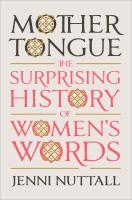
The author's biographical statement on the back flap of the jacket says that Nuttall has "had a lot of practice at making old words interesting," and it shows. I'd dare say reading this was even fun, along with being fascinating and very pointedly feminist. In this book, she explores the history of English words relating to women, to their bodies, social roles, and more. Specifically, she explores how our language has been shaped by patriarchal attitudes and has in turn worked to reinforce sexism.
Chapter topics include:
- Words for Female Anatomy
- Menstrual Language
- Sex and its Terms
- The Womb's Words
- The Language of Care
- Working Words
- Words for Ages and Stages
- Naming Male Violence
- Finding Feminism's Vocabulary
In writing about how the words hysteria and hysterical have been used to dismiss and punish the emotions of women, Nuttall proposes the word "testerical, meaning 'driven by testes and/or testosterone'" to give equal treatment to male emotions. She calls male misunderstandings of women's bodies and capabilities "logical phallusies." Here are some longer examples:
The history of the word clitoris shows us that its function was more or less understood from antiquity, though medical men were not always able to put their finger quite on the part itself. According to a dictionary of rare Greek words made by a grammarian in Alexandria in the fifth century AD, kleitoris referred to the skin covering female genitals--roughly in the right area if not exactly on the spot.
-----
Violence within marriage was acknowledged to be sexual as well as physical. During most of the history of English, being married created an ongoing, irreversible implied consent (a loathsome phrase) to sex. Appalling, and yet not some ancient common-law principle long since disowned. This legal opinion stayed with us, at least in theory, until it was finally overturned in Britain by the Sexual Offences Act of 2003. A husband couldn't (according to the law) rape his wife. Generally hidden from sight, marital rape thus appears in the oldest English only in the darkest hints. One medieval medical book describes what we would call birth injuries in labour. Women suffering from prolapses, where organs in the pelvis bulge into the vagina, often can't bear to have penetrative sex. But, says the writer, 'summe tyme they be constreyned to suffer, wyl they nyl they'. Sometimes they'll be forced to endure sex whether they want to or not. Likewise, the twelfth-century pamphlet written to put girls off getting married so that they might consider becomeing religious recluses says that a wife must put up with whatever a husband wants to do in bed 'wulle ha, nulle ha', will she, nill she, whether she wants to or not. Willy-nilly (as that little bit of rhyming grammar becomes in Modern English), a married woman's non-consent counts for nothing.
-----
By the time of the medieval and Renaissance English Bibles, translators had settled on the more familiar help or helper to describe Eve's purpose in life. But in the middle of the seventeenth century, Eve gets rebranded as Adam's helpmeet, that sickly-sweet description used for the ideal Protestant wife and mother, a handy appliance which every Early Modern home should have. It turns out that helpmeet is a grammatical misunderstanding, a word which was never meant to be. Helpmeet is spawned by English translations of the Bible verse in Genesis Chapter 2 which say that God made Adam 'a help meet for him'. Meet in this sense means 'fitting' or 'suitable', i.e. she's an appropriate assistant. The phrase got sandwiched into a single word by the addition of a wayward hyphen, a help-meet becoming a helpmeet. Whatever its origins, helpmeet made it clear that women were supposedly intended to be ancillary, not the boss but the assistant, not centre-stage star but supporting actress. And, after Adam and Eve's disobedience in eating the apple, God said that husbands should have power over their wives by way of punishment for Eve. Women were not only helpers but subordinates.
-----
In 1798, in her anonymously published Appeal to the Men of Britain, Mary Hays said with uncompromising candour that the gendered socialisation which shapes women's minds and controls their behaviour was 'perhaps the most completely absurd' system which human nature had dreamt up in a moment of madness, 'if indeed a bundle of contradictions and absurdities may be called a system'. Such glorious snark, giving patriarchy's dangly bits more and more of a well-deserved kicking.
"Language is fossil poetry," Ralph Waldo Emerson once wrote.
The poets made all the words, and therefore language is the archives of history, and, if we must say it, a sort of tomb of the muses. For, though the origin of most of our words is forgotten, each word was at first a stroke of genius, and obtained currency, because for the moment it symbolized the world to the first speaker and to the hearer. The etymologist finds the deadest word to have been once a brilliant picture. Language is fossil poetry. As the limestone of the continent consists of infinite masses of the shells of animalcules, so language is made up of images, or tropes, which now, in their secondary use, have long ceased to remind us of their poetic origin. But the poet names the thing because he sees it, or comes one step nearer to it than any other.
This book is a wonderful way to reflect on all of the forgotten and implied meanings to the words we use every day relating to women.
It's thoroughly, enjoyably enlightening and entertaining.
